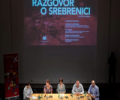New EU enlargement strategy: reconciliation still prerequisite for membership
 On Tuesday, 6th of February 2018, the European Commission (EC) announced a package of strategic documents on the European Union (EU)-s enlargement perspective to the Western Balkan countries. These documents remind the Western Balkan countries that political, economic and administrative reforms are a prerequisite for membership in the EU, identify key issues and the expected results of reforms, and present ways of engaging EU institutions in providing the necessary political, financial and expert support. According to the EC, the path to membership for the Western Balkan countries is a realistic prospective option, but will require genuine political commitment, essential reforms and the resolution of all bilateral disagreements. If Serbia achieves this ambitious plan, it can become an EU member as early as 2025.
On Tuesday, 6th of February 2018, the European Commission (EC) announced a package of strategic documents on the European Union (EU)-s enlargement perspective to the Western Balkan countries. These documents remind the Western Balkan countries that political, economic and administrative reforms are a prerequisite for membership in the EU, identify key issues and the expected results of reforms, and present ways of engaging EU institutions in providing the necessary political, financial and expert support. According to the EC, the path to membership for the Western Balkan countries is a realistic prospective option, but will require genuine political commitment, essential reforms and the resolution of all bilateral disagreements. If Serbia achieves this ambitious plan, it can become an EU member as early as 2025.
Along with reforms in the field of the rule of law, fundamental rights, economy and governance, enhanced regional cooperation and good neighbourly relations would have a determining effect on Serbia’s progress in European integration. In terms of reconciliation, additional efforts are needed to preserve peace and establish lasting stability in the Balkans. The EC believes that 25 years after the armed conflicts in the former Yugoslavia, it is time to resolve the open issues in the Region with more energy. In this respect, all countries will need to focus on overcoming the legacy of the past, achieving reconciliation and resolving open issues before joining the EU. This includes an effective and comprehensive normalization of relations and legally binding agreement between Serbia and Kosovo.
The EC insists that the political leaders of the region must assume ownership of regional cooperation, and help foster the good neighbourly relations and processes that lead to reconciliation. This includes an active struggle against nationalist narratives, intolerance of statements or actions that might spark interethnic tensions, and refraining from the glorification of war criminals.
The process of transitional justice, according to the EC, is incomplete, and requires the urgent addressing of problems in the area of war crimes prosecution, cooperation with the United Nations Mechanism for International Criminal Tribunals (MICT) and the Kosovo Specialist Chambers, resolving the fate of missing persons, improving the situation of refugees and internally displaced persons, and removing landmines. The states of the region should recognize the importance of working with young people in building the future, which is why an education that fosters tolerance, promotes European values and strengthens social cohesion will play an important role.
In order to support this transformation process, the EC also envisages the active engagement of EU institutions, framed within six flagship areas of interest, both for the countries of the region and for the EU. One of the areas is the Initiative for Reconciliation and Good-Neighbourly Relations, which includes:
- supporting initiatives that lead to reconciliation and transitional justice, such as the Regional Commission for the Establishment of Facts about War Crimes and Other Serious Violations of Human Rights during the Armed Conflicts in the Former Yugoslavia (RECOM);
- supporting the fight against impunity, through support to the Mechanism for the International Criminal Tribunals, both to deepen co-operation between national prosecutors and to inform the public, and to the Kosovo Specialist Chambers;
- working towards a regional solution to the issues of missing persons and landmines;
- supporting further reconciliation initiatives, such as the Regional Youth Cooperation Office.
The EC also announces its support for education as a precondition for peaceful coexistence and reconciliation, as well as for intensifying cooperation in the field of culture, youth and sports.







